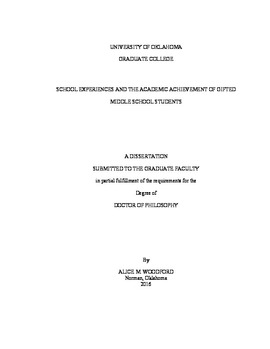| dc.contributor.advisor | Baines, Lawrence | |
| dc.contributor.author | Woodford, Alice | |
| dc.date.accessioned | 2016-05-17T16:12:53Z | |
| dc.date.available | 2016-05-17T16:12:53Z | |
| dc.date.issued | 2016-05-13 | |
| dc.identifier.uri | https://hdl.handle.net/11244/34735 | |
| dc.description.abstract | ABSTRACT
This study investigates the lifeworld of ten gifted middle school students in an attempt to determine the role school environment plays in the academic achievement. The inquiry focuses on the experiences of gifted students in a Title 1 middle school and how these experiences influence their academic achievement. This qualitative study builds on previous research in the area of gifted student perceptions of their learning environments (Adams-Byers, et al., 2004; Berlin, 2009; Peterson, et al., 2009) and the impact of the lifeworld of school on academic achievement.
The phenomenological framework of the study employs semi-structured interviews and student constructed drawings to gather students’ perspectives of the academic and social environment of a Title I middle school. Three themes emerge from the shared school experiences. The first theme, Peers, illustrates the importance preadolescents place on friends and underlines the influences of peers during this formative age. The second theme, identity, focuses on the choices students make while searching to find a balance between giftedness and acceptance in the lifeworld of middle school. The last theme, Outlook, reflects the importance placed on education by these students and their desire for relevant, authentic and challenging curriculum.
While the findings from this study can not be generalized, they indicate that the role peers play in the school experiences of gifted middle school students is influential in affecting student’s academic achievement and behavior. The study also reveals that gifted students who qualify for above grade level math classes are generally more academically successful and have a more defined gifted identity and persona than study participants who did not qualify for the advanced math program. The findings of this study contribute to the knowledge of gifted middle school students by listening to their voices, exploring their recommendations and highlighting the process and complexities of gifted student development in a Title I school.
Key words: Middle school, gifted, achievement | en_US |
| dc.language | en_US | en_US |
| dc.subject | Middle School, Gifted, Achievement | en_US |
| dc.title | School Experiences and the Academic Achievement of Gifted Middle School Students | en_US |
| dc.contributor.committeeMember | Hill, Crag | |
| dc.contributor.committeeMember | Houser, Neil | |
| dc.contributor.committeeMember | Ruan, Jiening | |
| dc.contributor.committeeMember | Vaughn, Courtney | |
| dc.date.manuscript | 2016-05-09 | |
| dc.thesis.degree | Ph.D. | en_US |
| ou.group | Jeannine Rainbolt College of Education::Department of Instructional Leadership and Academic Curriculum | en_US |
| shareok.nativefileaccess | restricted | en_US |
